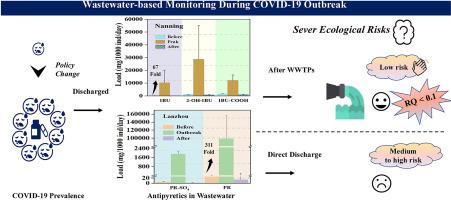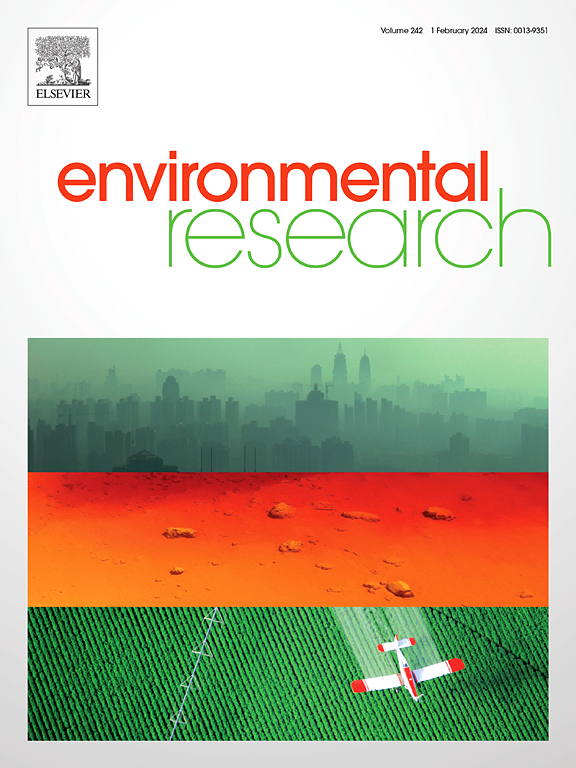Wastewater-based monitoring of antipyretics use during COVID-19 outbreak in China and its associated ecological risks
IF 7.7
2区 环境科学与生态学
Q1 ENVIRONMENTAL SCIENCES
引用次数: 0
Abstract
At the end of 2022, a sudden policy shift in China triggered an unprecedented COVID-19 outbreak that led to a dramatic increase in the consumption of antipyretics. In this study, the occurrence of the two most commonly used antipyretics (ibuprofen and paracetamol) and their metabolites were analyzed in the wastewater of nine major cities in China, covering the periods before, during, and after the policy change. The remarkable surge after the policy change for ibuprofen and paracetamol reached 67 times (in Nanning) and 311 times (in Lanzhou) compared to pre-pandemic levels, respectively. The variation of increases was mainly affected by the availability and the sampling period. During the outbreak period, direct discharge of high-drug-load wastewater could cause even higher risks; the RQ values were 0.43 for invertebrates in Lanzhou and 0.30 for fish in Nanning. Furthermore, during the post-pandemic period, wastewater discharge might pose high risks (RQ value was 2.58 in Xining to algae) associated with ibuprofen chronic toxicity. Fortunately, wastewater treatments would significantly reduce this risk to a low level (RQ < 0.1). In some less developed areas, the lack of a comprehensive wastewater treatment system may lead to the direct discharge of untreated wastewater due to exfiltration of sewers, overflow of combined sewers, or lack of centralized or decentralized treatment facilities. Establishing a comprehensive wastewater treatment system is of great importance, especially in remote and impoverished areas. These results indicated that the potential ecological risks associated with epidemic outbreaks should not be overlooked. These risks may be heightened due to acute toxicity during health incidents, such as the COVID-19 outbreak, providing valuable insights for ecological management in future public health crises.

基于废水的新型冠状病毒肺炎疫情期间退烧药使用监测及其相关生态风险
2022年底,中国突然的政策转变引发了前所未有的COVID-19疫情,导致退烧药的消费量急剧增加。本研究分析了中国9个主要城市的废水中最常用的两种解热药(布洛芬和扑热息痛)及其代谢物的发生情况,涵盖了政策变化前、中、后三个时期。与大流行前相比,布洛芬和扑热息痛政策改变后的显著增长分别达到67倍(南宁)和311倍(兰州)。增长的变化主要受可得性和采样周期的影响。在疫情爆发期间,直接排放高药量废水可能造成更高的风险;兰州市无脊椎动物RQ值为0.43,南宁市鱼类RQ值为0.30。大流行后,西宁市污水排放对藻类的RQ值为2.58,可能存在布洛芬慢性毒性的高风险。幸运的是,废水处理将显著降低这种风险到低水平(RQ)
本文章由计算机程序翻译,如有差异,请以英文原文为准。
求助全文
约1分钟内获得全文
求助全文
来源期刊

Environmental Research
环境科学-公共卫生、环境卫生与职业卫生
CiteScore
12.60
自引率
8.40%
发文量
2480
审稿时长
4.7 months
期刊介绍:
The Environmental Research journal presents a broad range of interdisciplinary research, focused on addressing worldwide environmental concerns and featuring innovative findings. Our publication strives to explore relevant anthropogenic issues across various environmental sectors, showcasing practical applications in real-life settings.
 求助内容:
求助内容: 应助结果提醒方式:
应助结果提醒方式:


